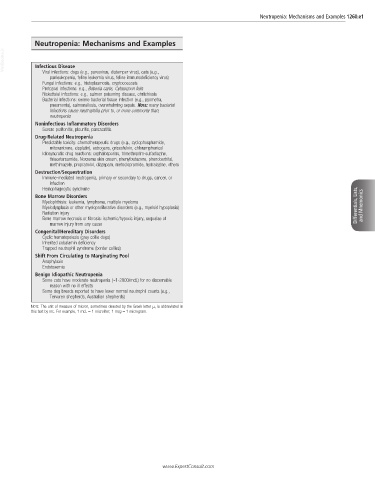Page 2520 - Cote clinical veterinary advisor dogs and cats 4th
P. 2520
Neutropenia: Mechanisms and Examples 1260.e1
Neutropenia: Mechanisms and Examples
VetBooks.ir Infectious Disease
Viral infections: dogs (e.g., parvovirus, distemper virus), cats (e.g.,
panleukopenia, feline leukemia virus, feline immunodeficiency virus)
Fungal infections: e.g., histoplasmosis, cryptococcosis
Protozoal infections: e.g., Babesia canis, Cytauxzoon felis
Rickettsial infections: e.g., salmon poisoning disease, ehrlichiosis
Bacterial infections: severe bacterial tissue infection (e.g., pyometra,
pneumonia), salmonellosis, overwhelming sepsis. Note: many bacterial
infections cause neutrophilia prior to, or more commonly than,
neutropenia
Noninfectious Inflammatory Disorders
Severe peritonitis, pleuritis, pancreatitis
Drug-Related Neutropenia
Predictable toxicity: chemotherapeutic drugs (e.g., cyclophosphamide,
mitoxantrone, cisplatin), estrogens, griseofulvin, chloramphenicol
Idiosyncratic drug reactions: cephalosporins, trimethoprim-sulfadiazine,
thiacetarsamide, Noxzema skin cream, phenylbutazone, phenobarbital,
methimazole, propranolol, diazepam, metoclopramide, hydralazine, others
Destruction/Sequestration
Immune-mediated neutropenia, primary or secondary to drugs, cancer, or
infection
Hemophagocytic syndrome
Bone Marrow Disorders
Myelophthisis: leukemia, lymphoma, multiple myeloma
Myelodysplasia or other myeloproliferative disorders (e.g., myeloid hypoplasia) Differentials, Lists, and Mnemonics
Radiation injury
Bone marrow necrosis or fibrosis: ischemic/hypoxic injury, sequalae of
marrow injury from any cause
Congenital/Hereditary Disorders
Cyclic hematopoiesis (grey collie dogs)
Inherited cobalamin deficiency
Trapped neutrophil syndrome (border collies)
Shift From Circulating to Marginating Pool
Anaphylaxis
Endotoxemia
Benign Idiopathic Neutropenia
Some cats have moderate neutropenia (≈1-2000/mcL) for no discernable
reason with no ill effects
Some dog breeds reported to have lower normal neutrophil counts (e.g.,
Tervuren shepherds, Australian shepherds)
NOTE: The unit of measure of micron, sometimes denoted by the Greek letter μ, is abbreviated in
this text by mc. For example, 1 mcL = 1 microliter; 1 mcg = 1 microgram.
www.ExpertConsult.com

